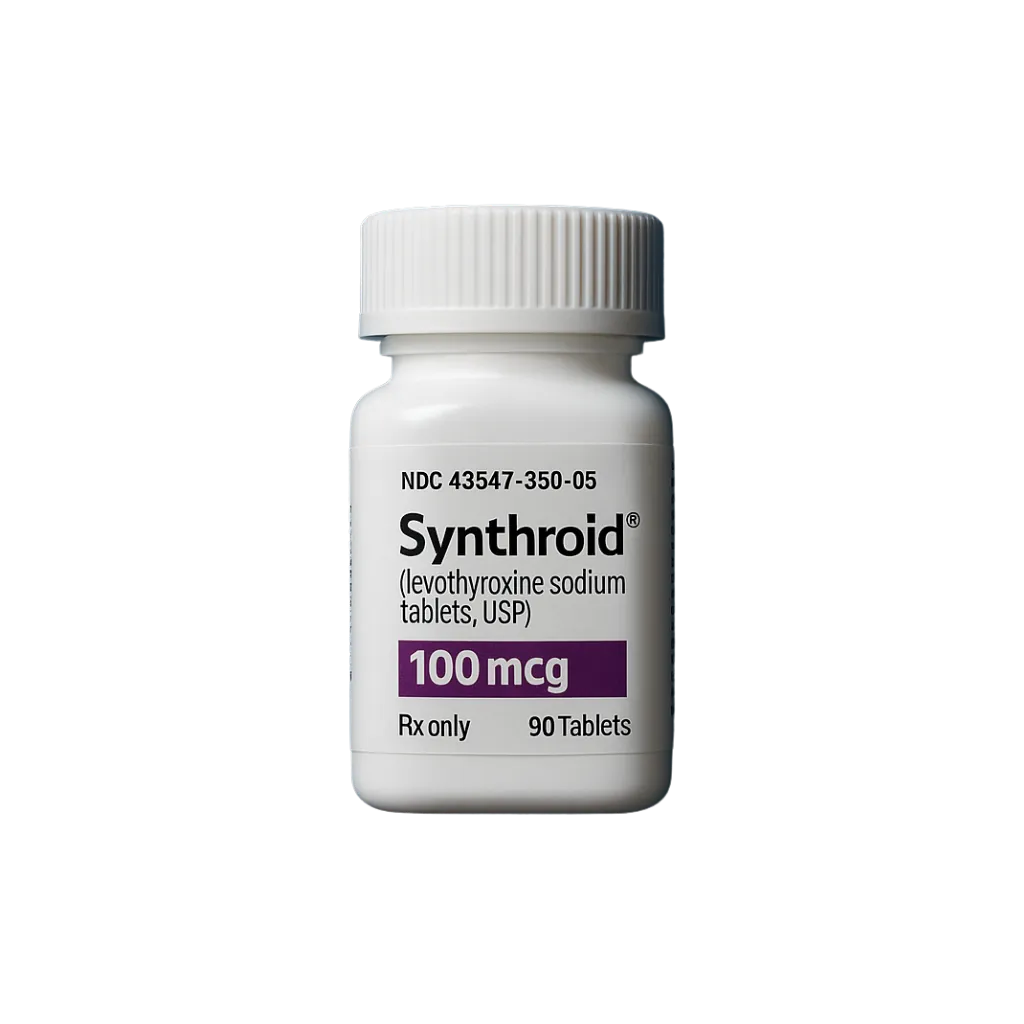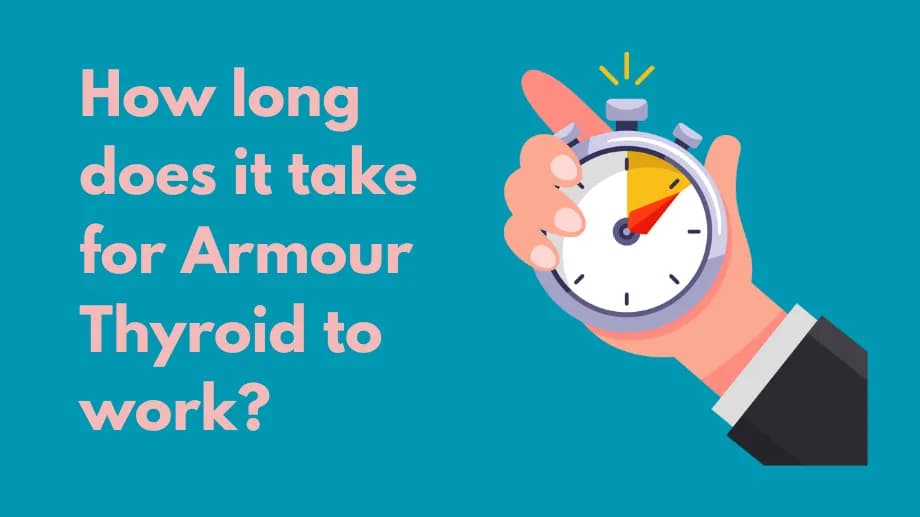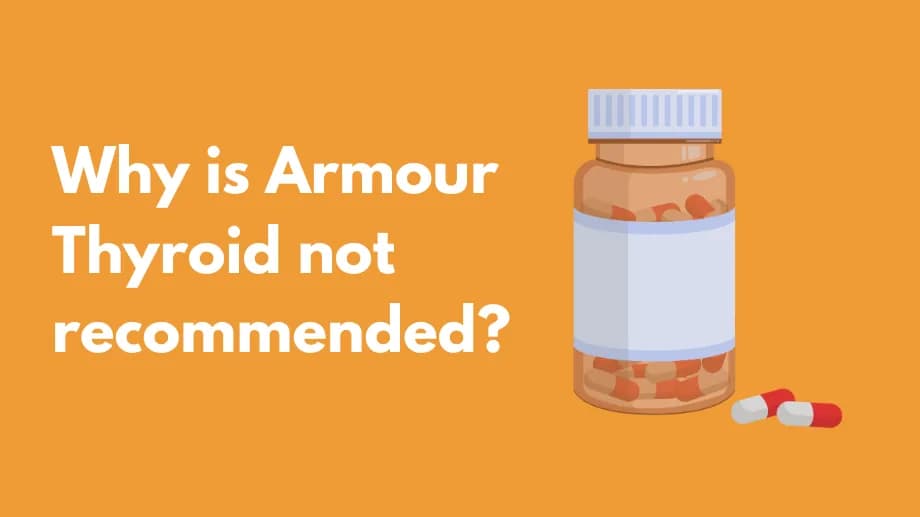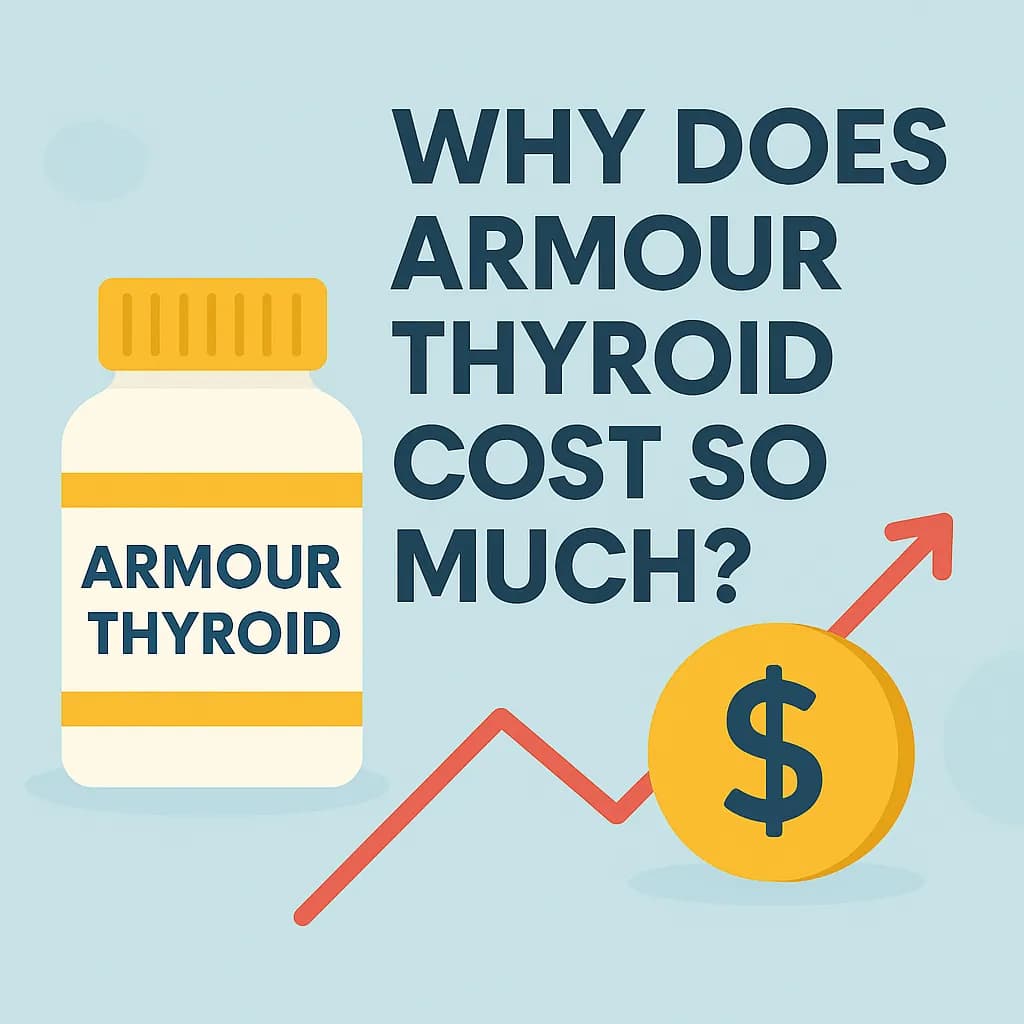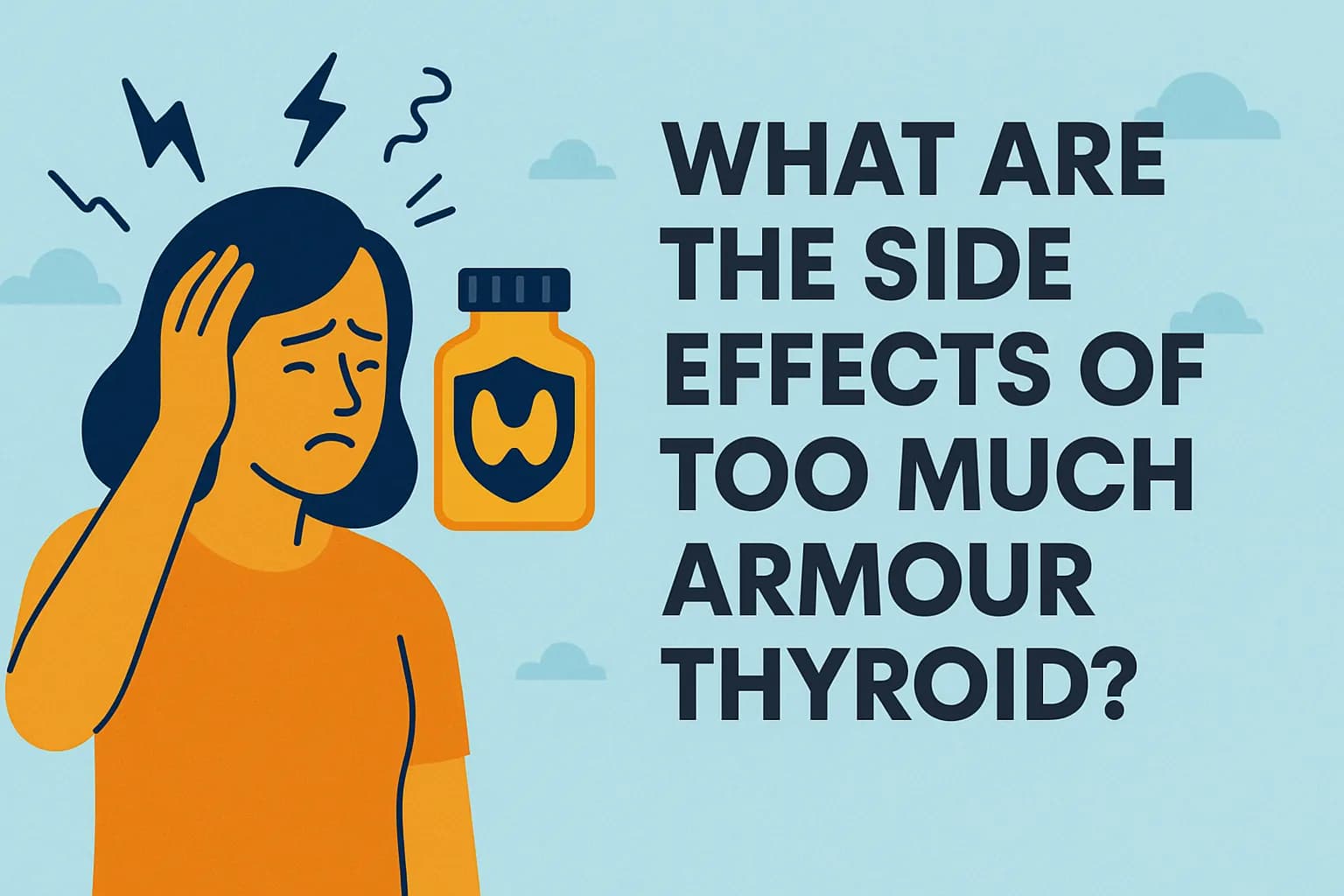What are the side effects of too much Armour Thyroid?
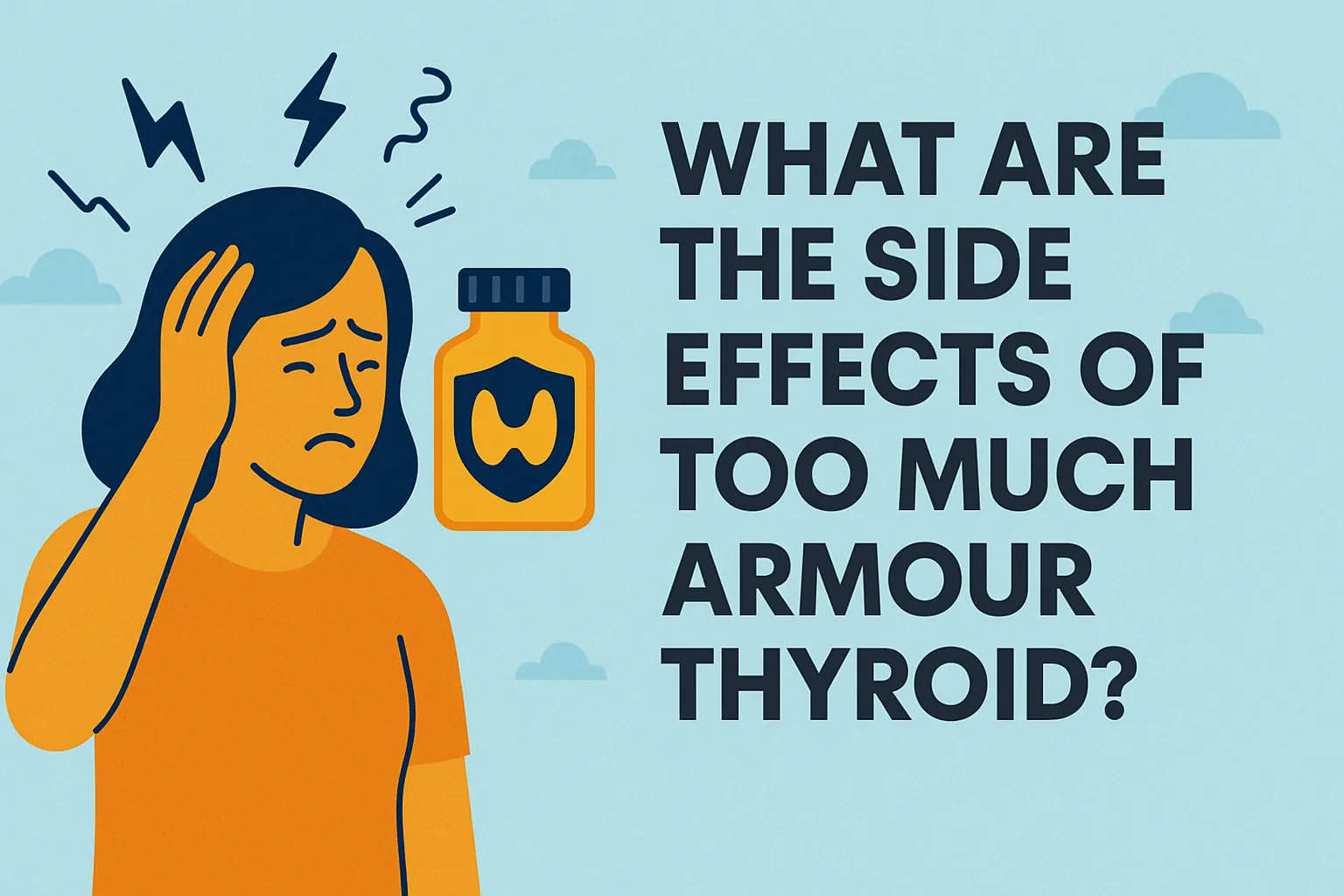
Armour Thyroid (desiccated thyroid) is a prescription medication used to treat certain thyroid disorders. Many adults and children with hypothyroidism and other thyroid conditions find relief from taking Armour Thyroid medication. However, some people may not be able to take it due to possible side effects and interactions with other medicines.
How often side effects occur with Armour Thyroid or which side effects are the most common are not known. This is because medication was available before the U.S. Food and Drug Administration (FDA) began its drug approval process so no clinical studies were performed to determine this information. However, side effects typically happen with this medication if the levels of thyroid hormones in your body are too high. This condition is known as thyrotoxicosis (overactive thyroid) and may occur if your dose of Armour thyroid is too high.
Some people may experience mild to serious side effects while taking Armour Thyroid. Some of these side effects can include:
- Increased heart rate
- Rapid pulse or heart palpitations
- Chest pain
- Tremors
- Muscle weakness
- Excessive sweating
- Anxiety or nervousness
- Diarrhea or increased bowel movements
Typically, these side effects are only temporary and are easy to manage. If you experience any of these side effects, talk with your healthcare provider. Don’t stop taking this medication unless they recommend it.
Serious side effects have been also reported with this medication. These side effects typically occur if your thyroid hormone levels are very high. Serious side effects that can be caused by taking too much Armour Thyroid include a thyroid storm. This is a life-threatening health condition that is commonly associated with untreated or undertreated hyperthyroidism. During a thyroid storm, your heart rate, body temperature, and blood pressure can increase to dangerously high levels. Without immediate treatment, it is often fatal. There is also a boxed warning from the FDA concerning serious, life-threatening adverse effects when you take Armour Thyroid for weight loss. Armour Thyroid should not be used for weight loss. It is not recommended, safe, or effective for this purpose.
If you develop serious side effects while taking Armour Thyroid, call a healthcare professional right away. If you think you are having symptoms of a thyroid storm, call 911 or seek immediate medical attention.
Keep reading as this blog will go over the uses of Armour Thyroid, drug interactions, and warnings you will want to know before starting this medication.
What is Armour Thyroid?
Armour Thyroid (desiccated thyroid) is a naturally derived combination of the triiodothyronine (T3) and thyroxine (T4) thyroid hormones made by your thyroid gland. It is used to treat hypothyroidism, including Hashimoto’s thyroiditis, a condition where your thyroid gland does not produce enough thyroid hormone. It is also used to decrease thyroid-stimulating hormone (TSH) levels in people with thyroid goiters, nodules, or thyroid cancer.
Thyroid hormones have important functions like controlling your metabolism, body temperature, heart rate, and more. When the amount of hormone is too low, taking a thyroid hormone replacement like Armour Thyroid can increase the levels of T3 and T4 hormones in your body, help restore normal thyroid function and improve your overall well-being.
Are there drug interactions with Armour Thyroid?
When Armour Thyroid is taken with other drugs, it can change how they work or make some adverse effects more likely or severe. You should ask your healthcare provider if any of the prescription drugs, over-the-counter (OTC) medications, vitamins, or supplements you take may interact with Armour Thyroid, including:
Shop Medications
- Cholesterol-lowering medications such as colestipol or cholestyramine
- Other thyroid medications such as levothyroxine and liothyronine
- Diabetes medications such as insulin, glipizide, metformin, and pioglitone
- Certain birth control pills such as norethindrone/ethinyl estradiol (Junel Fe) and ethinyl estradiol/norgestimate (Sprintec)
- Iron
- Warfarin
- Midodrine
Disclaimer: These are not all of the possible drug interactions with Armour Thyroid. Ask your healthcare provider for medical advice before starting any new prescription or OTC medication.
Are there warnings and precautions for Armour Thyroid?
Before starting using Armour Thyroid, be sure to let them know any medical conditions you have, including:
- Heart disease or other cardiovascular problems such as angina (chest pain), heart arrhythmias, high blood pressure
- Adrenal gland issues
- Diabetes
- Are pregnant or plan on becoming pregnant
- Are breastfeeding or plan on breastfeeding
- Had a previous allergic reaction (swelling or trouble breathing) to Armour Thyroid
Can Armour Thyroid cause weight gain?
Weight gain is an uncommon side effect of Armour Thyroid but can occur if your dose is not high enough to get your thyroid hormone levels back to normal. It is not uncommon for you to lose up to 10% of your body weight when starting a thyroid medication like Armour Thyroid. This weight is typically water weight, since having an underactive thyroid makes you retain water, and weight gain is one of the symptoms of hypothyroidism.
Will you lose your hair when taking Armour Thyroid?
Some people who take Armour Thyroid may also experience hair loss. This typically occurs during the first few months of treatment as your body adjusts to this medication. You may also have hair loss if your thyroid hormone levels get too high. If you experience hair loss or thinning while taking Armour Thyroid, talk to your healthcare provider. You may need a lower dose of this medication. Your hair will typically grow back once the levels of thyroid hormone in your body return to normal.
Why would doctors not prescribe Armour Thyroid?
Doctors in the U.S. may not prescribe Armour Thyroid because it is not actually approved by the FDA. This is because it became available before the FDA started its drug approval process. They may also hesitate to prescribe Armour Thyroid if you have certain medical conditions, such as a history of heart disease, diabetes, or certain types of thyroid cancer. It may not be a safe or effective medication for you in this case.
Sources
- Armour Thyroid Package Insert. (2024). AbbVie, Inc. Accessed Oct. 8, 2024.
- Hypothyroidism (Underactive Thyroid). National Institute of Diabetes and Digestive and Kidney Diseases. Accessed Oct. 8, 2024.
- Toloza FJK, et al. Patient Experiences and Perceptions Associated with the Use of Desiccated Thyroid Extract. Medicina (Kaunas). 2020 Apr 3;56(4):161. Accessed Oct. 8, 2024.
- Older therapies aren’t necessarily better for thyroid hormone replacement. FDA. Accessed Oct. 8, 2024.
- Thyroid desiccated (Rx). Medscape. Accessed Oct. 8, 2024.

